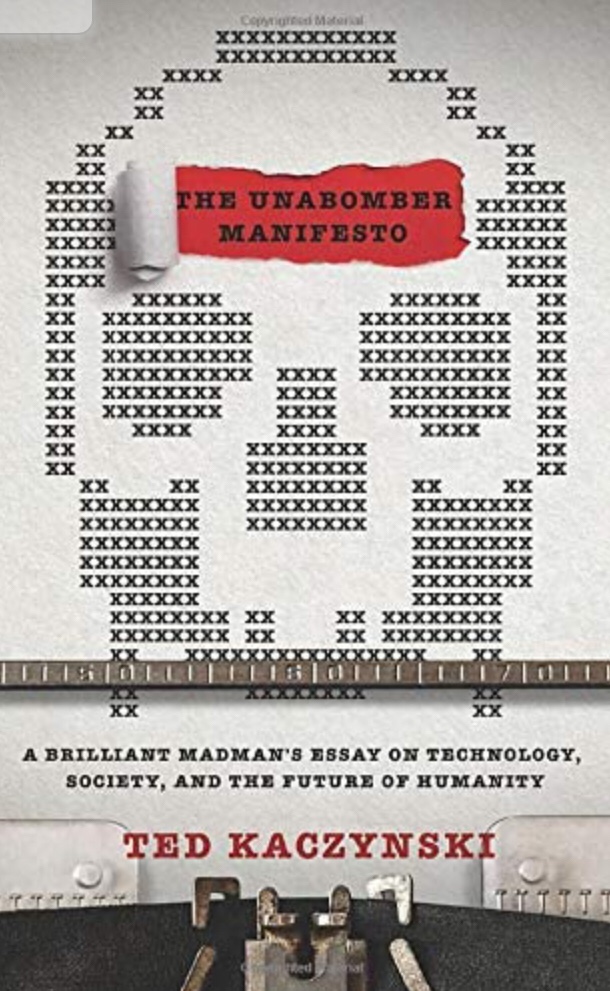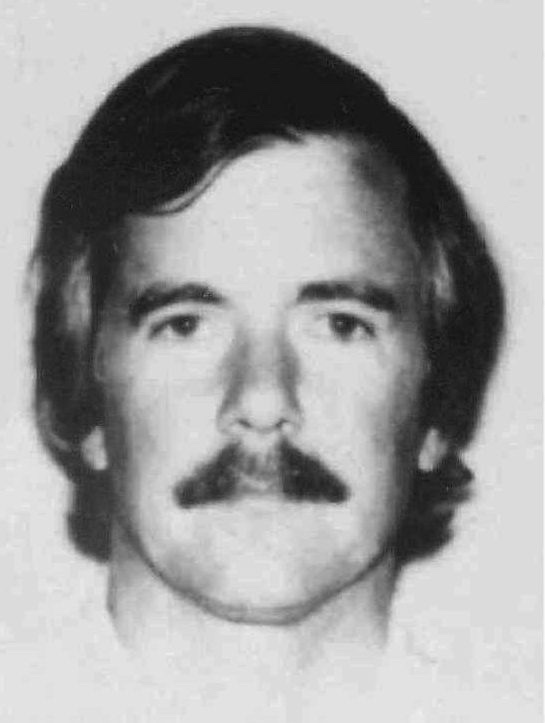‘Never forget that the human race with technology is just like an alcoholic with a barrel of wine.’ Ted Kaczynski


I really like the quote at the top of this post. It’s from Ted Kraczyinki’s Industrial Society & Its Future, aka The Unabomber Manifesto. I like it because I think it captures extremely succinctly and very powerfully a very real trait of contemporary humanity, our addiction to technology.
Only the other day the latest copy of The Idler plopped through our letterbox, and the cover feature is an interview with Microsoft employee and tech guru Jaron Lanier (I’d never heard of him before!), and is about how the internet has enslaved us. At least according to the ‘strap line’!

I’m someone who doesn’t shy away from some of the darker rabbit holes of history. For example, my interest in WWII has lead me to read numerous biographies of Churchill, Stalin and Hitler.
Nothing too controversial so far, perhaps? I mean, Churchill is regularly described as one of the greatest of Britons. Hitler and. Stalin, tho’? I will admit I felt slightly grubby or suspect, even, just purchasing Mein Kampf, which I’m part way through reading at present (it’s a pretty stodgy read, before one even addresses the author’s ideas).
If one fears polluting one’s mind with dangerous ideas, ought one to even contemplate reading what might be the demented ravings of, say, a serial murderer, like Anders Brevik, or the Unabomber? [1]
Several modern serial killers have published ‘manifestos’. I don’t know this for sure, not having read much in that line, but normally, from what I’ve gathered about those by folk like Brevik and Brenton Tarrant, the Christchurch (NZ) Mosque shooter, they’re like the worst kind of modern school essays, composed from cut and paste plagiarism. Never mind the drivel that passes for the content.
Anyway, as I’m steering this from the less obviously or overtly threatening arena of biog’s of the ‘Great Men’ of history (great in terms of historical impact, as opposed to great as a friend/human being!), to the writings of convicted serial killers, one might reasonably ask, is this risking a rapid slide downhill into a moral cesspool?
Hitler, Stalin, even Churchill, all sent vastly larger numbers to premature graves, even if they admittedly didn’t personally perform any/many lethal acts themselves. In quantitative terms, at least, they put Ted K in the shade!
But enough prevarication! In this post I am talking about the ideas of a convicted serial murderer. A man frequently dismissed as insane; note the ‘brilliant madman’s essay’ bit in the pic at the top of this post. So, having just read Industrial Society & Its Future, this post aims to ask, is anything Kaczynski says true, interesting, valid, or worth pursuing further?


Throughout the 35,000 word document Kaczynski repeatedly refers to himself as we, or FC (this latter purportedly standing for Freedom Club), something that is rather st odd with his outsider/lone-wolf m.o. But I guess he’s suggesting he speaks for more than just himself. And that could very easily be true enough.
On one occasion he even alludes to the fact that, without his having killed, he wouldn’t have attained his goal of getting his thoughts published and – he hoped – widely read.
Interestingly, having already waged a long lethal campaign of terror, successfully evading detection, he used the threat of deadly violence in two ways in relation to his manifesto. Violence had got him attention, and now it was to be both carrot and stick, when he approached parts of the US media with the aim of getting his thoughts published.
On the one hand, the carrot, he promised to cease and desist from his bombing campaign, if his manifesto was printed. But on the other, the stick, he threatened to kill again if his writings appeared in Playboy, preferring instead the more high-brow NY Times and Washington Post!


I read somewhere online – I can’t recall where – that Kaczynski claimed his killing of computer store owner Hugh Scrutton (pictured above) was ‘humane’, and the victim ‘probably didn’t feel anything’. Other and more reliable/plausible sources of information suggest Scrutton remained conscious and took about 30 minutes to die. Obviously such a gap between the perpetrators’ perception of his actions and the real consequences doesn’t cast the Unabomber in a good light.
Stepping back momentarily from the messy and personal nitty gritty of individual lives, deaths, maiming, etc, what at first appears mind-bogglingly awful – killing another person to get your views across – is in fact, historically, relatively normal human behaviour, albeit that this is not something so readily or so happily admitted to nowadays.
And to varied degrees modern societies tend to seek to quell or at least control this aspect of our natures.
But governments, and even corporations, continue to do it all the time. When governments do so, it’s called – depending on degrees of lethality – such things as Diplomacy, or Foreign Policy. Or at it’s most blatantly lethal, War.
When individuals outside of the traditional power politics frameworks act in this way, depending on their targets/motivations, it’s generally going to be labelled either freedom fighting or terrorism, depending also where the relative parties (and observers/commentators) stand.
But setting aside how Kraczynski got his platform, do the key ideas in Industrial Society & It’s Future have any useful insights or merit? I don’t really know why this suddenly became interesting to me. But it did [2]. And for this reason I wanted to read it. So I did a little ‘googling’, and soon found it, archived via the newspapers that originally (and with state/security forces backing) published it.
It’s a very long essay, in numbered paragraphs with quite a few footnotes. Some of Kaczynski’s former life as a student/academic/professor, clearly lives on! This said, structurally and in terms of content, and despite the author’s obvious intelligence, it is also quite rambling, and perhaps lacking in coherent structure.

Worse still, like many critiques of modern society, wherever they might originate from, left/right, anarchist, libertarian, whatever – oh, and America as a whole, and Kaczynski along with her, has serious issues with the whole idea of ‘leftism’! – it’s strong on critique and weak on solutions.
Anyway, I suppose now is the time/place to précis the contents. I, like Kaczynski, am fond of endless digressions, and feel a compelling need to qualify anything I might be thinking or saying to the nth degree. I’ll try and spare you that now! As simply and as brutally as I can, I’ll synopsise the TK/FC diatribe.
Rather bizarrely, to me at least, the whole thing is bookended, fore and aft, with his railing against ‘leftism’. For now I’m simply leaving that issue at that, i.e. duly noted. What’s much more interesting, to me at any rate, is his expatiating on modern society and our seemingly exponentially increasing dependency on technology.
To cut a long story short, I think he’s essentially correct in his analysis: in essence modern or post-industrial-revolution society is a vast and brutal ‘super organism’. And one that has gathered its own momentum, in which the human species has now been almost completely reduced to an enabling agent. Cogs in the machine, the grease that keeps the wheels spinning.
The consequences for individuals, in terms of the loss of personal freedom, have been very radical indeed, and are, by and large, a fairly recent loss. The damage is not wrought on the psyches of individuals alone either, but also on the ‘natural world’, or our environment. This is something Kaczynski feels keenly. As indeed do many nowadays, a lot of whom might be shocked to learn that Kaczynski is, in this respect, a ‘fellow traveler’.

There were times as I read this that I thought to myself, ‘Ah, but Ted, you’ve missed such and such’. For example he likes to say ‘The Industrial Revolution and its consequences have been a disaster for the human race.’ And he frequently harks back to the 19thC in particular, on this theme. But he does also, if only in passing, allude to the fact that humanity’s ability to affect nature may have deeper roots.
I recently read Against The Grain, in which James C. Scott goes much, much, much further back, placing humanity’s domestication of fire as the start of our leaving a discernible imprint on the planet. But Scott also makes the point that most of humanity remained living mostly outside of state control until very recently. And in this respect, despite differing in details, the essence of their sweeping vision remains much the same; only very recently has humanity become enslaved by the super-organism that is modern society.
The major issue, obviously, is what, if anything, can be done? And with Kaczynski, the lone wolf, that translates to ‘what can one do’, individually, about this new evolutionary context we find ourselves seemingly inescapably enmeshed in? Kaczynski’s answer is to seek to destroy it. That’s where he and I part company.
Some might say ‘why bother to read the ravings of a nutjob?’ Well, we might say Kaczynski’s nuts. But I’m interested in what sends folk over the edge. Maybe our society is in need of change, and maybe not all who oppose the status quo are de facto insane. Maybe even those driven to the most overtly shocking or barbaric acts can still teach us all something about ourselves?
I found Kaczynski’s ‘manifesto’ interesting, it didn’t seem to me like the ravings of a lunatic. His issues with leftism are things you can hear people say very frequently, both here in the UK and the US. Many of them could equally well be said of aspects of ‘the right’ (I hate the whole left/right binary thing, it’s so limiting in scope!). But as I said above, I’m not going down that rabbit hole in this post. His grievances with ‘Industrial Society’ seem genuine and, for the most part, understandable.

What I take away from having dared to read the ravings of a lunatic, so to speak, is that our society does indeed face many serious issues, and that the answers are far from simple.
If you’re interested enough to want to read it, the text of the manifesto can be found here.
NOTES:
[1] My mum, bless her, was worried when I bought a WWII German tanker’s cap, at a ‘40s show (I also bought some British uniform gear), lest putting it on my noggin might somehow transmit evil Nazi brainwaves from cloth to psyche! I reassured her that it was a repro’ item, and not a genuine WWII piece.
[2] Possibly it came to mind around the 9/11 anniversary? At times like that we sometimes wonder – as well as mourning the passing of the victims of terrorism – what motivates the perpetrator/terrorist.





